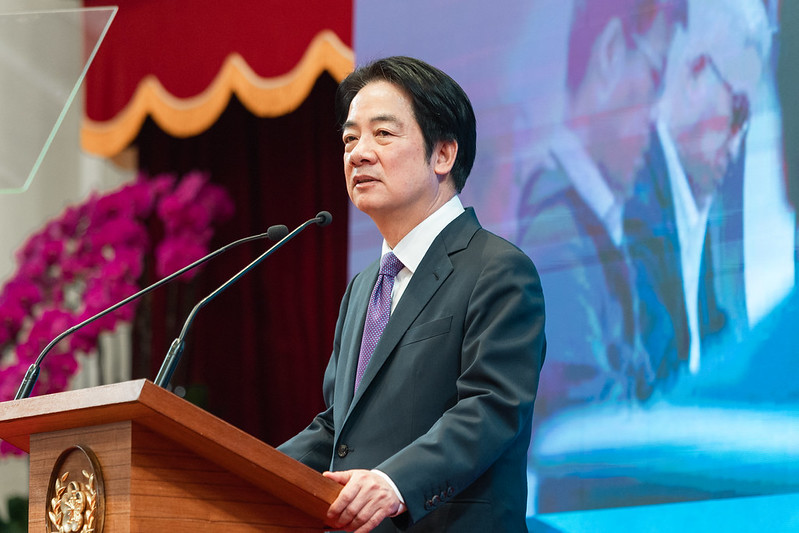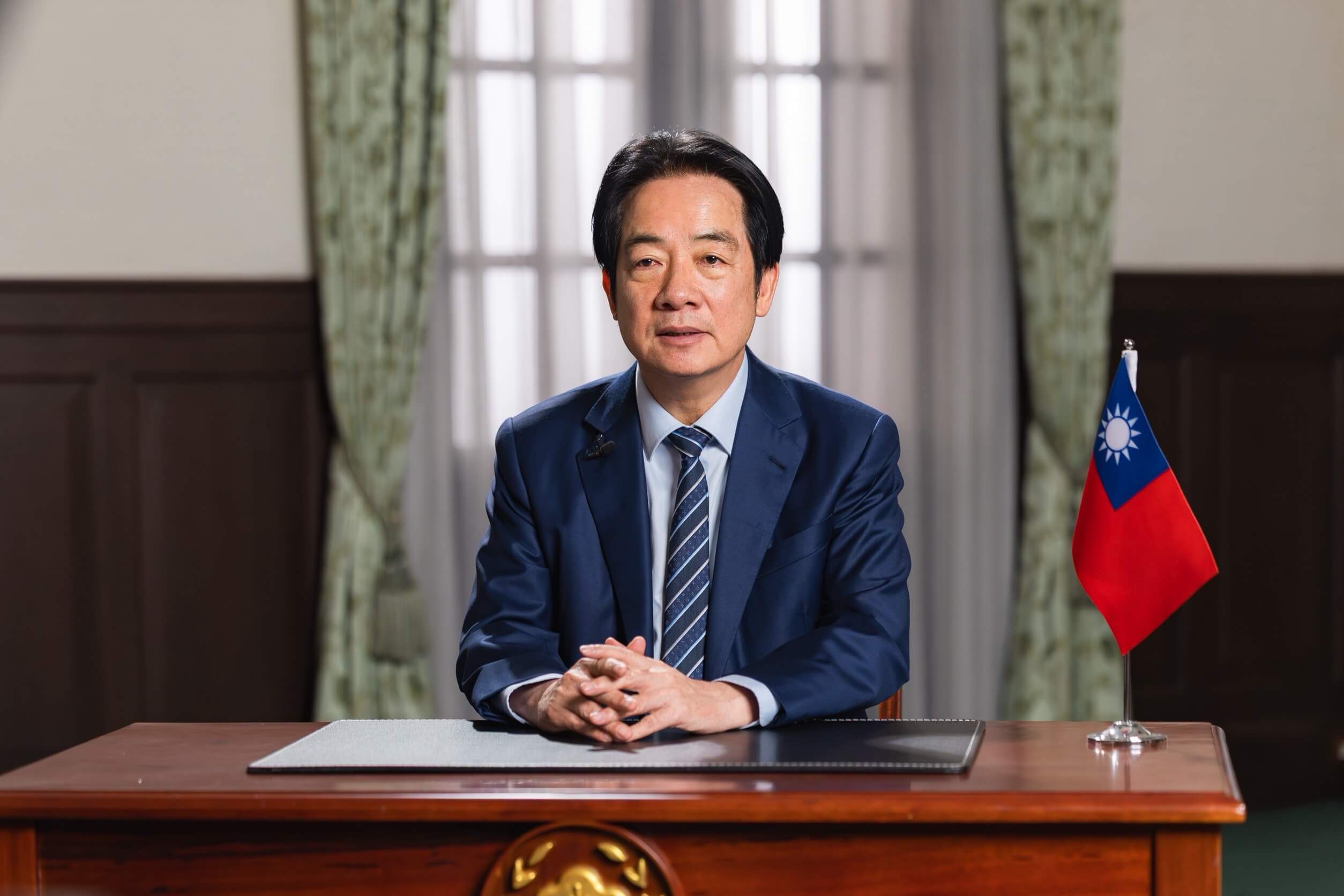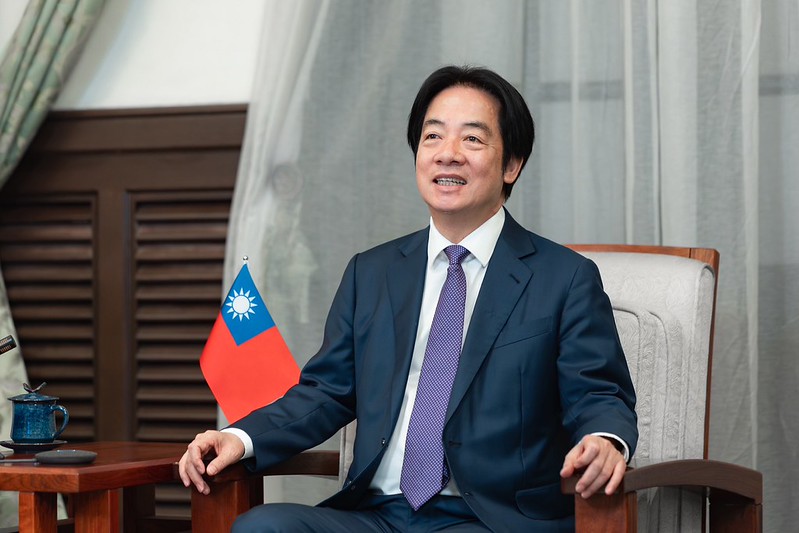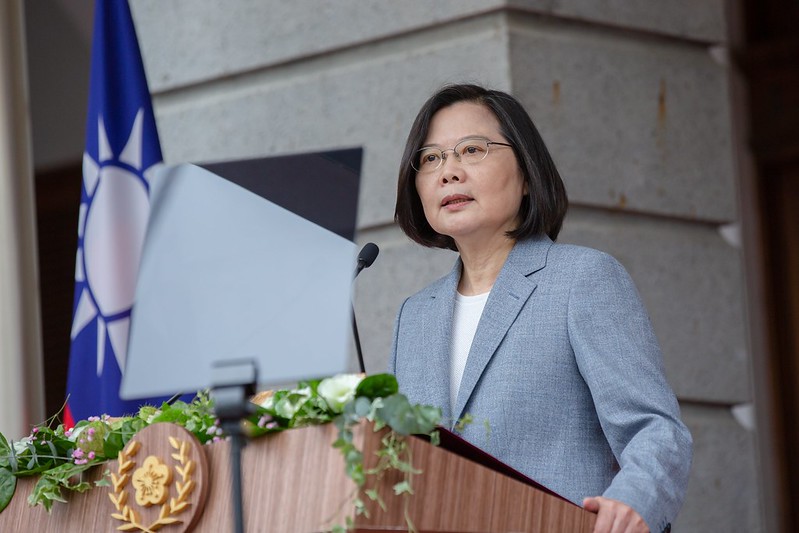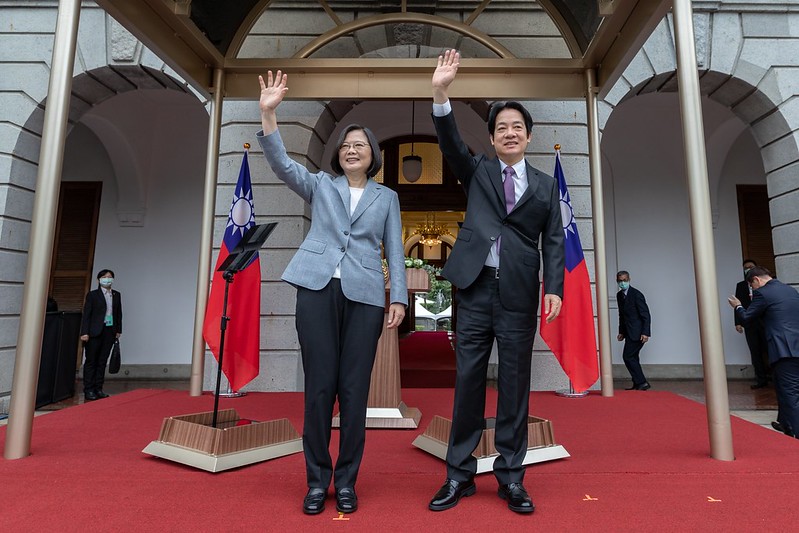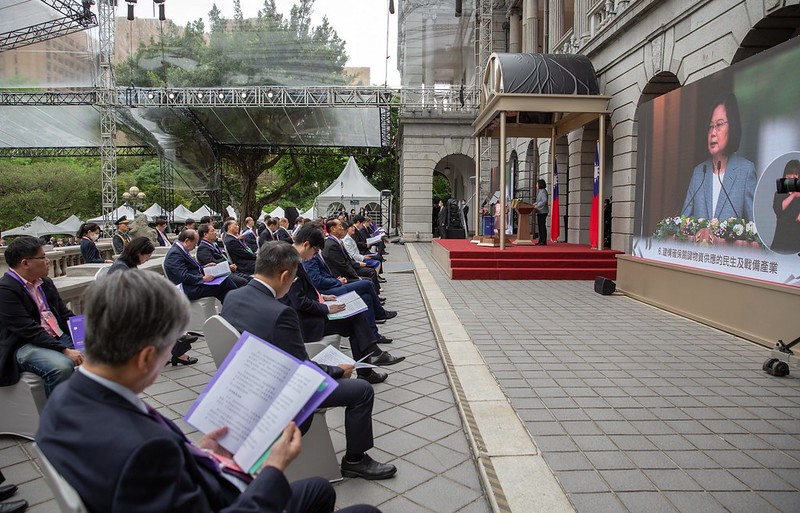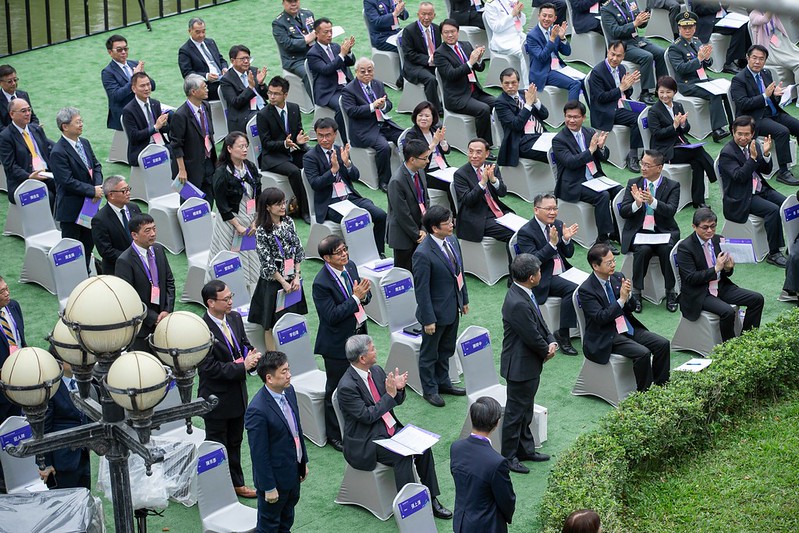News & activities
 News releases
News releases
On the morning of May 20, ROC 15th-term President Tsai Ing-wen and Vice President Lai Ching-te attended inaugural celebrations at the Taipei Guest House. President Tsai also delivered her inaugural address.
A translation of the president's remarks follows:
Vice President Lai, esteemed guests, friends watching on TV and online, my fellow citizens across the country, good morning.
A Taiwanese Community
I feel immensely grateful to stand here once again today and take on the responsibility entrusted to me by the Taiwanese people.
This inauguration ceremony is unique in the history of the Republic of China. What makes it special is not its size or the number of people in attendance. It is special because we know how difficult it has been for us to get to this point.
I want to thank the people of Taiwan for making such a difficult feat possible.
I particularly want to thank a group of people who have not received a lot of attention over the past four months in our fight against COVID-19. I want to thank every single person who waited in line outside of the pharmacy in the early days of the coronavirus outbreak. Thank you for your patience, and thank you for trusting the government. You have shown the world Taiwan's commitment to civic virtues, even in times of greatest distress.
I also want to thank everyone who was quarantined or isolated at home, putting up with inconvenience in your daily life to keep others safe and healthy. Thank you for exemplifying humanity's best qualities and helping us successfully bring the coronavirus outbreak under control.
This sense of pride in our country, this community's shared destiny, and the memories of these past months will live on in all of our hearts. This is what solidarity feels like.
Many ambassadors and representatives from other countries are here today, and I trust that many countries around the world are watching Taiwan as well.
I want to take this opportunity to tell you that the country you see is populated by kind and resilient people. No matter the difficulties we face, we can always count on our democracy, our solidarity, and our sense of responsibility towards each other to help us overcome challenges, weather difficult times, and stand steadfast in the world.
Unprecedented challenges and unparalleled opportunities
From January to now, Taiwan has amazed the international community twice. The first was our democratic elections, and the second was our success in the fight against COVID-19.
In recent months, Taiwan's name has appeared in headlines around the world, thanks to our successful containment of the coronavirus outbreak.
"Taiwan" is also emblazoned on the boxes of supplies we are sending abroad. The Taiwanese people have the kindest hearts in the entire world, and we will always offer help to the international community whenever we are able.
I hope that in addition to sharing in a sense of pride and joy, my fellow citizens can take to heart the spirit of "helping ourselves to help others;" "when we help ourselves, others will help us."
This pandemic has not yet ended, and we must remain vigilant. Even when it ends, its impacts will linger on.
The coronavirus has profoundly affected our world. It has changed the global political and economic order, accelerated and expanded the reorganization of global supply chains, restructured the global economy, and changed the way we live and shop. It has even changed the way the international community views Taiwan and developments in the surrounding region.
These changes present us with both challenges and opportunities. I want to ask that my fellow citizens be prepared, because countless challenges and difficulties remain ahead of us.
Over the next four years, only those who can end the pandemic within their borders, lay out a strategy for their country's survival and development, and take advantage of opportunities in the complex world of tomorrow, will be able to set themselves apart on the international stage.
It takes more than fervor to govern a country. Leadership means calmly taking the right direction in a changing world. That is precisely what I have done over the past four years.
I said before that I will leave you with a better country. So over the next four years, I will proactively develop our industries, foster a safe society, ensure national security, and deepen our democracy. I am going to reinvent Taiwan and lead our country into the future.
National Development
1. Industrial and Economic Development
I know that the Taiwanese people are most concerned about our industrial and economic development. In 2016, we initiated a new economic development model to help connect Taiwan's economy to the world. Over the past four years, despite massive changes in the international economy, Taiwan has done more than just weather the storm. Our economic growth has once again topped the Four Asian Tigers, and the stock market index now regularly breaks 10,000 points.
Thanks to our successful control of the pandemic, so far, Taiwan is able to maintain positive economic growth. This is rare in the world. However, we need to continue to take early action on economic relief and revitalization, and do whatever it takes to maintain stable economic growth.
Over the next four years, we will face more intense changes in the global economy and the accelerated reorganization of supply chains. We will continue to implement our Forward-looking Infrastructure Development and trillion NT-dollar investment programs. We will do so in the spirit of "achieving growth through stability, and seizing opportunity amid changes," in order to secure Taiwan's economic development over the coming decades.
In terms of industrial development, we are going to take advantage of the opportunities before us in six core strategic industries founded on our 5+2 Innovative Industries Program, to transform Taiwan into a critical force in the global economy.
● Six Core Strategic Industries
First, we will continue to develop our information and digital industries. We will take advantage of Taiwan's strengths in the semiconductor and ICT industries to secure a central role in global supply chains, and make Taiwan a major base for the development of next generation technologies, including IoT and AI.
Second, we are going to develop a cybersecurity industry that can integrate with 5G, digital transformation, and our national security. We will strive to create cybersecurity systems and an industrial chain that can protect our country and earn the world's trust.
Third, we are going to create biotech and medical technology industries integrated with the rest of the world. Throughout this pandemic, Taiwanese teams have proven that they are capable of working with world-class technologies to produce reagents and develop new drugs and vaccines. We are going to give these industries our utmost support, and transform Taiwan into a key force in the global battle against infectious diseases.
Fourth, we are going to develop national defense and strategic industries by integrating military and civilian capabilities. In addition to domestically-produced naval vessel and aircraft programs that are currently underway, we will push harder to promote technological integration between the military and the private sector, to stimulate private sector production capabilities, and advance into the aviation and space industries.
Fifth, we are going to accelerate the development of green energy and renewable energy industries. Over the past four years, renewable energy has experienced explosive growth, and Taiwan has become a hotspot for international investment. Building on this foundation, I am confident that we will achieve our goal of deriving 20% of our overall power generating capacity from green sources by 2025. We are going to make Taiwan a center for green energy in Asia.
Sixth, we are going to establish strategic stockpile industries that can ensure the steady provision of critical supplies. Facing changes to the global order, we need to keep key industrial chains in Taiwan and maintain a certain degree of self-sufficiency in the production of face masks, medical and daily supplies, energy, and food.
In the current international climate, countries that end their dependence on others will have a head start on national development. I would like our friends across all industries to rest assured that our government stands with you. Over the next few years, we have several strategies to drive the growth of our industries.
● Industrial Development Strategy
First, we will use domestic demand, particularly demand from the public sector and national security needs, as the basic engine for our industrial development.
A prime example of this is the way strategic demand for face masks and other medical supplies throughout this pandemic has spurred the development of related industries. We can adopt a similar model for our national defense and renewable energy industries to help accelerate their development.
We will continue to organize "national teams," like our face mask team, according to the size and conditions of different industries. We will utilize our government's guarantee of domestic demand to establish a global strategic materials manufacturing industry under the "Taiwanese brand" and help it expand into other markets.
We know that financial support is crucial to industrial development. Looking to the future, we will adopt more flexible financial policies, continue to reform financial systems, and use more diverse means to help industries obtain the financing they need.
We will also work to create a safe environment for our industries. Our government is committed to maintaining sound public health and national security systems, a stable society, strong rule of law, and a healthy market. We need to offer these guarantees so that high-tech and strategic industries will be willing to choose Taiwan as their production and R&D base.
We will also continue to guide the global expansion of our industries. We will keep working to sign trade or investment protection agreements with the United States, Japan, and European countries.
As we continue to promote our New Southbound Policy, we will also develop other potential markets and encourage firms to establish operations there, giving our industries an edge when they engage in international cooperation. Overseas Taiwanese business communities around the world will be our best partners as we seek new international opportunities.
Finally, we have the issue of talent. In order for Taiwan to become a key global economic force, we need a diverse talent pool. My government will bring in the world's top technical, R&D, and management talents to help globalize Taiwan's workforce, widen our industries' horizons, and give them the ability to compete in the international arena.
Looking to the future, Taiwan must further connect with the international community. We will work to cultivate more outstanding bilingual and digital talents, giving our industries a global competitive edge.
Over the next four years, Taiwan's economy will enter a new stage, complete with more flexible capital and talent flows, more robust industrial capabilities, and closer ties with the world. Together, we are going to enter a new era of shared prosperity.
2. Safe Society: Health and Social Safety Nets to Catch Those Who Need Help
As we develop our industries, we will also keep in mind that the people expect the government to foster a safe society. To be a better country, the government must take on more responsibilities to reduce the burden on the people and mitigate issues in society.
Over the past few years, we have addressed Long-term Care 2.0, childcare, and residential justice issues. Over the next four years, my goal is to weave an even tighter net that can catch every single person who needs help and prevent future tragedies.
● Health and Disease Prevention Safety Net
First, we will strengthen our health and disease prevention safety net. Taiwan is an ageing society, and infectious diseases pose a serious challenge to the health of our people. That is why we need to bolster our disease prevention and treatment capabilities and link industries to make more breakthroughs in vaccine and new drug development, as well as infectious disease prevention and treatment, so that people can enjoy healthy lives and receive better care.
● Mending Gaps in the Social Safety Net
Our second step will be to mend the gaps in our social safety net. Over the past few years, a great deal of discussion has arisen around public safety incidents involving schizophrenia patients. The same goes for other mental illnesses, drug addiction, and domestic violence.
I understand your concerns. These issues are not just the responsibility of individuals or families; they are the responsibility of the government. When families are unable to provide proper care, the government has a duty to step in and help.
I am going to upgrade our social care system, enhance the capabilities of frontline social workers, and improve their work environments, so that they can work at the grassroots and identify people who have fallen through the gaps in our safety net.
We cannot hold medical agencies or individual judges solely responsible for controversies surrounding specific cases. Our judicial and executive branches should reevaluate and optimize these systems and take initiatives to make any necessary legal amendments.
3. National Security: National Defense Reforms, Active International Participation, Peaceful and Stable Cross-strait Relations
A better country requires a greater emphasis on national security. Over the past four years, we have pushed for national defense reforms, active international participation, and peaceful, stable cross-strait relations. We hope that Taiwan can play a more active role in the peace, stability, and prosperity of the Indo-Pacific region. Over the next four years, the direction of our policies will remain the same, and we will do even more.
● National Defense Reforms
We have three important directions for our national defense reforms. First is accelerating the development of our asymmetrical capabilities. While we work to bolster our defense capabilities, future combat capacity development will also emphasize mobility, countermeasures, and non-traditional asymmetrical capabilities. We will also work to strengthen our defenses against the threats of cyber warfare, cognitive warfare, and "unrestricted" warfare to achieve our strategic goal of multidomain deterrence.
The second is substantive reforms to our military reserve and mobilization systems. We need to enhance the quality of our reserve forces, as well as their weapons, equipment, and training, in order to achieve effective jointness with our regular forces. We also need to establish a standing, interdepartmental system connecting our reserve and mobilization systems. This system will help coordinate personnel and supplies, so that we can successfully mobilize during a transition from peacetime to war.
Third is improvements to our military's management institutions. Today's young servicemembers have all grown up in a democratic society, and one of our most important missions will be to find ways for them to better utilize their professional skills in line with military needs.
Some young servicemembers have difficulties adjusting to military needs, reflecting the gap between today's society and our military management institutions. We need to work to close that gap. We need to reduce negative societal views of the military and end the gradual erosion of our military's prestige and morale due to individual incidents caused by imperfect institutions.
Thus, we will improve appeal and counseling mechanisms within the military, establish a fair and equitable incident investigation mechanism, and regularly evaluate personnel placements. In terms of education and training, we will strengthen leadership capacities across all levels of leadership and foster a modern management system that emphasizes professionalism.
We need to strike a balance and find a way to accommodate the team-oriented military discipline needed for actual combat and society's respect for the individual.
● Active International Participation
Over the past four years, we have actively taken part in addressing major global issues, including counter-terrorism cooperation, humanitarian assistance, religious freedom, and non-traditional security.
Throughout this global pandemic, we have been praised for providing selfless assistance to the international community wherever we are able.
Taiwan has been deemed a democratic success story, a reliable partner, and a force for good in the world by the international community. All Taiwanese people should take pride in this.
Over the next four years, we will continue to fight for our participation in international organizations, strengthen mutually beneficial cooperation with our allies, and bolster ties with the United States, Japan, Europe, and other like-minded countries.
We will also participate more actively in regional cooperation mechanisms and work hand-in-hand with countries in the region to make concrete contributions to peace, stability, and prosperity in the Indo-Pacific region.
● Peaceful and Stable Cross-strait Relations
In the face of complex and changing cross-strait circumstances, we have made the greatest effort to maintain peace and stability in the Taiwan Strait over the past four years, gaining approval from the international community. We will continue these efforts, and we are willing to engage in dialogue with China and make more concrete contributions to regional security.
Here, I want to reiterate the words "peace, parity, democracy, and dialogue." We will not accept the Beijing authorities' use of "one country, two systems" to downgrade Taiwan and undermine the cross-strait status quo. We stand fast by this principle.
We will continue to handle cross-strait affairs according to the Constitution of the Republic of China and the Act Governing Relations between the People of the Taiwan Area and the Mainland Area. This has been our consistent position for maintaining the peaceful and stable status quo in the Taiwan Strait.
Cross-strait relations have reached a historical turning point. Both sides have a duty to find a way to coexist over the long term and prevent the intensification of antagonism and differences. Faced with changing circumstances, I will hold firm to my principles, adopt an open attitude to resolve issues, and shoulder my responsibilities as President. I also hope that the leader on the other side of the Strait will take on the same responsibility, and work with us to jointly stabilize the long-term development of cross-strait relations.
Strengthening State Institutions and Democracy
While we work to achieve national development, it is crucial that we optimize our government institutions over the next four years. Our Legislative Yuan will establish a constitutional amendment committee, giving us a platform to engage in dialogue and reach a consensus on constitutional reforms pertaining to government systems and people's rights.
This democratic process will enable the constitutional system to progress with the times and align with the values of Taiwanese society. Our first priority should be to lower the voting age from 20 to 18, an issue on which both the majority and opposition parties are in agreement.
In terms of judicial reform, I delivered on my promise to convene a National Congress on Judicial Reform, and we completed amendments to the Judges Act, the Attorney Regulation Act, the Constitutional Court Procedure Act, and the Labor Incident Act. This is all base work for the further improvement of our judicial system.
However, our judicial reforms are still in transition, and our current progress has not yet met the public's expectations. I will continue to solicit opinions from across society and keep pressing forward. The people's dissatisfaction drives us to continue on the path of reform.
Within the next four years, we need to implement a lay judge system, so that citizens can act as lay judges in court and become catalysts for judicial reform. This will help bridge the distance between the people and our judicial system, so that it aligns better with their expectations and earns their trust.
All constitutional institutions must also continue on the path of reform. The Executive Yuan will reevaluate and reinitiate its organizational reform process, including the establishment of a specialized digital development agency and adjustments to all ministries in line with current needs. This will enable governance capabilities to be more responsive to the needs of national development.
The National Human Rights Commission under the Control Yuan will officially be established in August of this year. This will be a milestone in our journey to place human rights at the center of Taiwan's national ethos, and marks the start of a new chapter for the Control Yuan.
Our new Examination Yuan team will be instated in September, and I will ask them to propose a comprehensive reform plan and evaluate past policies, so that they can become an effective human resource department that can cultivate the talent a modern government needs.
Conclusion
My fellow citizens, over the past 70 years, the Republic of China (Taiwan) has grown more resilient and unified through countless challenges. We have resisted the pressure of aggression and annexation. We have made the transition from authoritarianism to democracy. Although we were once isolated in the world, we have always persisted in the values of democracy and freedom, no matter the challenges ahead of us. We will always remain committed to our common belief: Taiwan must help ourselves to help others, and when we help ourselves, others will help us.
Many of the heroes in our fight against COVID-19 are here with us today, including members of our national face mask team, our Central Epidemic Command Center's public health team, and Premier Su Tseng-chang's (蘇貞昌) team.
There are many more heroes from all walks of life not in attendance today: medical workers, postal workers, pharmacists, convenience store clerks, taxi drivers, and many more.
I may not be able to call out all of your names, but I want everyone to know that Taiwan has overcome countless challenges over the past 70 years, relying on not just one or two heroes, but thanks to countless heroes such as yourselves, working together to turn the wheels of history. You have helped make Taiwan a happy, safe, and prosperous place for generations to come.
I want to express my respect to all of you. Every single person in Taiwan is a hero. Vice President Lai and I are honored to take on the responsibility you have entrusted to us.
Taking on the responsibility of the President of the Republic of China in such difficult times brings me more pressure than joy. But I will not back down, because all of you are with me.
The path forward will not be easy, and greater challenges await us. But we are a country that has persevered through even the greatest hardships. We, the 23 million people, have always been and will always be a community with a shared destiny.
I truly hope that all of my fellow citizens will remember how it felt to come together to overcome the challenges of the past few months. The Republic of China can be united. Taiwan can be safe. Being Taiwanese can be an honor that makes you hold your head high.
My dear citizens, the path ahead of us is long, and we are about to begin a new chapter in Taiwan's story. Taiwan's story belongs to each and every one of us, and it needs each and every one of us.
I ask that the 23 million people of Taiwan act as our guides and partners. Let us pool our wisdom and courage and make this country a better place together. Thank you.

